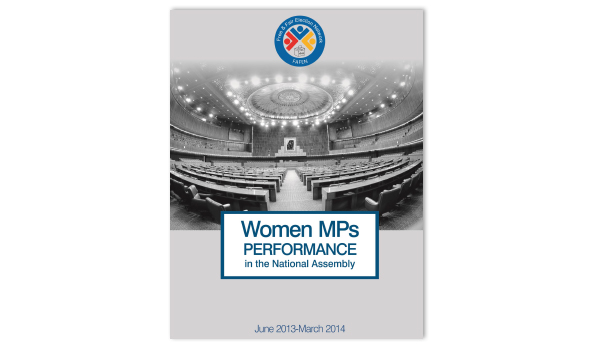 As the first parliamentary year of the incumbent 14th National Assembly is nearing to an end, women legislators performed impressively, asserting themselves in their lawmaking role, according to a Free and Fair Election Network on the International Women’s Day.
As the first parliamentary year of the incumbent 14th National Assembly is nearing to an end, women legislators performed impressively, asserting themselves in their lawmaking role, according to a Free and Fair Election Network on the International Women’s Day.
They played an active role in the lawmaking process by submitting 12 private member bills (six singly and six jointly with their colleagues). These bills mainly focused of issues pertaining to governance, human rights, democracy and political development. Similarly, women parliamentarians, singly, submitted 20 resolutions, 14 calling attention notices, 1,383 questions, 22 motions under rule 259 and raised 64 points of order during the reporting period.
Women members occupy one-fifth of the National Assembly’s seats. Currently, there are total of 340 members – 60 on reserved seats, eight through direct elections and one on minority reserved seat. As many as 68 women legislators actively participated in the parliamentary proceedings either by submitting agenda on Orders of the Day or taking part in the on-floor details.
In a report released by the Inter-Parliamentary Union (IPU) on the comparison of women parliamentarians in lower houses in various countries, Pakistan ranks at 66 – a higher proportion than some of its regional neighbors such as Bangladesh (ranked 71), India (ranked 108) and Sri Lanka (ranked 130). Though, 18 women were directly elected in the last 13th National Assembly, it has decreased to eight for the current National Assembly. Pakistan Peoples’ Party Parliamentarian (PPPP) has won five direct women seats and Pakistan Muslim League-Nawaz (PML-N) three.
Women have been appointed on important portfolios in the National Assembly – the State Ministers for National Health Services, Regulations and Coordination, and Information Technology are women. Similarly, the Parliamentary Secretaries for Interior and Narcotics Control and Petroleum and Natural Resources are women MNAs while the Standing Committee on Information, Broadcasting and National Heritage is also being chaired by a woman.
The performance of women parliamentarians is based on FAFEN data (June, 2013 till March, 2014) gathered from direct observation of the proceedings of the bicameral parliament as well as the four provincial assemblies. The report puts forward an analysis on the performance of National Assembly members (MNAs) against various interventions such as bills, resolutions, questions, calling attention notices and motions for debates. However, as parliamentary member’s performance is based on interventions appearing in the plenary, there may be more agenda submitted by female lawmakers that was tabled but not presented in the House.
Overall women tabled 12 legislations – six singly and six jointly with their male colleagues. Half of the resolutions tabled in the first parliamentary year (44 of total 88) were sponsored by women MNAs – 20 singly and 24 jointly. Women were active in conducting oversight of government ministries and departments by submitting 1,383 questions and 54 calling attention notices (CANs) on the agenda. To hold discussions on public issues, they submitted 25 motions (under Rule 259).
For complete report click here








